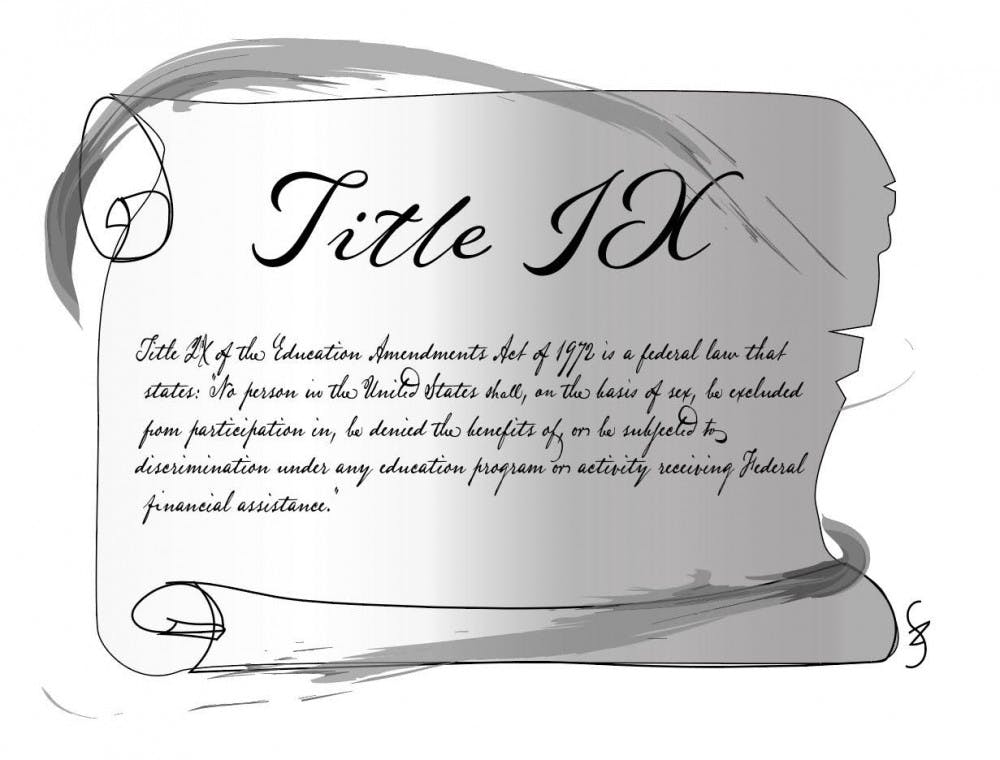President Christina Paxson P ’19 submitted a public comment to the U.S. Department of Education on behalf of the University to recommend changes to the Department’s proposed Title IX regulations, according to a community-wide email sent by Paxson Jan. 29.
Title IX, a federal law passed in 1972, “prohibits discrimination on the basis of sex in any educational program or activity that receives federal funding.”
In the email, Paxson wrote that the University supports three recommendations issued by the Association of American Universities Jan. 24 — namely, requests that the DOE “remove requirements that institutions permit live cross-examination and appoint aligned advisors,” who may be professional attorneys. The third endorsed recommendation involves “remov(ing) the requirement that universities apply the same standard of evidence and process across all disciplinary processes.”
The University also endorsed the AAU’s suggestion that the DOE clarify whether it intends to limit the “circumstances an institution may forbid and investigate behavior that falls outside the Department’s definition of ‘sexual harassment,’” Paxson wrote.
The Department’s proposed regulations, which were introduced by Secretary of Education Betsy DeVos in November 2018, could significantly alter how schools address and investigate cases of sexual and gender-based harassment and violence, she wrote.
Under the proposed regulations, students facing accusations of sexual misconduct would have greater protections, and a school’s legal responsibility to investigate sexual misconduct cases would be limited to incidents that occur on campus or within a school-sponsored event, according to an article by the Chronicle of Higher Education. Previously, the guidelines allowed universities to use a “preponderance of evidence” standard, which created a lower threshold for investigation.
The proposed regulations would also allow institutions to use a higher standard of proof in sexual misconduct cases and would narrow the legal definition of sexual misconduct upon which academic institutions are required to act. Under the Obama administration, sexual harassment was defined as “unwelcome conduct of a sexual nature.” If implemented, the new regulations would define it as “unwelcome conduct on the basis of sex that is so severe, pervasive and objectively offensive that it effectively denies a person equal access to the recipient’s education program or activity,” according to the Chronicle of Higher Education.
These proposed changes would impose “potentially damaging ‘one-size-fits-all’ restrictions,” which would be at odds with the University’s current policies and procedures, Paxson wrote. Instead, the DOE should provide institutions with “maximum flexibility” to follow the Title IX requirements in a way that “reflects their unique values and distinctive educational missions,” she wrote. “Brown’s current policies and procedures governing sexual misconduct came out of an open process that incorporated substantial input from students, faculty and staff and, as such, they reflect our norms, values and approach to education.”
Additionally, the proposed requirement allowing advisors, who may be professional attorneys, to conduct live cross-examinations during hearings would introduce inequity to the investigation process because students may be “unable to afford legal representation,” Paxson wrote. Furthermore, “a shift to a more adversarial ‘courtroom’ environment” could discourage some students from reporting cases of sexual misconduct, she wrote. “This would be especially unfortunate, given clear empirical evidence that sexual misconduct is already vastly underreported.”
In an email to The Herald, Paxson wrote that “it is critically important that institutions of higher education not become substitutes for criminal courts. … I am troubled by efforts to introduce to campus disciplinary proceedings aspects of the legal system that characterize courts of law.”
As it now stands, the University uses paper cross-examinations in Title IX cases, directly conflicting with this proposed requirement, The Herald previously reported.
The DOE issued a notice of proposed rulemaking to revise the Title IX regulations Nov. 16, The Herald previously reported. Following this notice, interested parties could express their thoughts and concerns about the changes during a 60-day period for public comment.
Should the proposed regulations go into effect, Paxson also reiterated the AAU’s request that universities be given appropriate time to implement any required changes.





